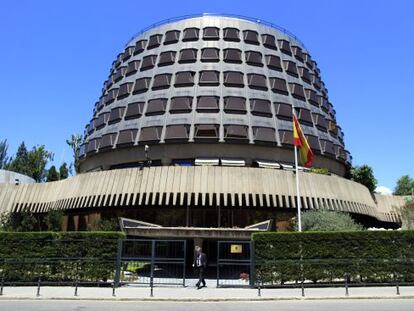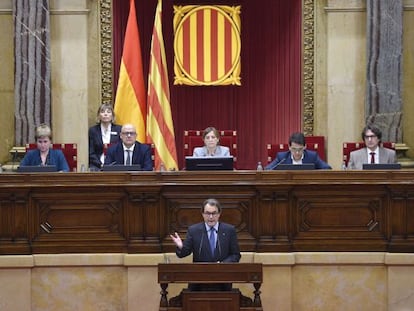Former head of Catalan regional government faces trial over independence referendum
Artur Mas and two other officials accused of overstepping authority by setting up 2014 unofficial poll

The magistrate in charge of an investigation into a non-binding referendum on independence for the Catalonia region, which was held on November 9, 2014, has ruled that the ongoing probe into the actions of Artur Mas, the pro-independence former head of the regional government of Catalonia, should continue.
This takes the politician one step closer to seeing the inside of the courtroom, on possible charges of disobedience and overstepping his authority for his role in organizing the unofficial plebiscite.
The magistrate argues that private companies hired to organize the vote continued to work after the Constitutional Court ban
Catalonia’s High Court has also begun proceedings against Irene Rigau, a former member of the regional administration, along with Joana Ortega, the former deputy head of the regional government, for their involvement in organizing the vote, which was fiercely opposed by the central government in Madrid.
In a statement released on Tuesday, the High Court judge announced that he would be requesting the start of a trial, having rejected the defense’s call for the case to be shelved.
In the writ, the magistrate argues that despite the vote being banned by the Constitutional Court on November 4, 2014, the regional government went ahead with preparations to hold the informal referendum, and states that the actions that were “necessary” to carry out the process were “promoted” by Mas, Rigau and Ortega. He adds that they “intentionally and consciously openly refused” to obey the “mandate from the Constitutional Court.”
The magistrate bases these arguments on the fact that private companies that had been hired by the Catalan government to organize the vote continued to work after the Constitutional Court had banned the poll from being held. “Mas permitted and failed to stop the different hiring procedures,” the judge continues, including the “preparation of a press room in [Barcelona neighborhood] Montjuïc.”
Sign up for our newsletter
EL PAÍS English Edition has launched a weekly newsletter. Sign up today to receive a selection of our best stories in your inbox every Saturday morning. For full details about how to subscribe, click here
For several years, Artur Mas was at the forefront of a challenge by the Catalonia region to move toward independence from Spain, which culminated in the Catalan parliament approving an independence resolution on November 9, 2015, a year after the referendum took place.The document called on Catalan lawmakers to draft three new laws within 30 days that would lead to a new Constitution and the creation of a separate social security system and local treasury. But the most controversial part of the motion were clauses stating that Spain’s Constitutional Court has no say over Catalan affairs.
However, inconclusive regional elections several months before had left Mas unable to garner sufficient support in the regional parliament to form a government, forcing him to do a deal with the anti-capitalist CUP party. After months of political deadlock, Mas stood aside to make way for Carles Puigdemont, the former mayor of Girona, to be voted in by the regional parliament as the new premier.
The road map to independence Puigdemont defended in his investiture speech was the same as that agreed under Mas’s leadership. Puigdemont said the new government will not only defend the idea of proclaiming independence from Spain within 18 months, but also the steps laid out in the motion declaring the start of the breakaway process that has been struck down by the Spanish Constitutional Court.
English version by Nick Lyne & Simon Hunter.
Tu suscripción se está usando en otro dispositivo
¿Quieres añadir otro usuario a tu suscripción?
Si continúas leyendo en este dispositivo, no se podrá leer en el otro.
FlechaTu suscripción se está usando en otro dispositivo y solo puedes acceder a EL PAÍS desde un dispositivo a la vez.
Si quieres compartir tu cuenta, cambia tu suscripción a la modalidad Premium, así podrás añadir otro usuario. Cada uno accederá con su propia cuenta de email, lo que os permitirá personalizar vuestra experiencia en EL PAÍS.
En el caso de no saber quién está usando tu cuenta, te recomendamos cambiar tu contraseña aquí.
Si decides continuar compartiendo tu cuenta, este mensaje se mostrará en tu dispositivo y en el de la otra persona que está usando tu cuenta de forma indefinida, afectando a tu experiencia de lectura. Puedes consultar aquí los términos y condiciones de la suscripción digital.










































